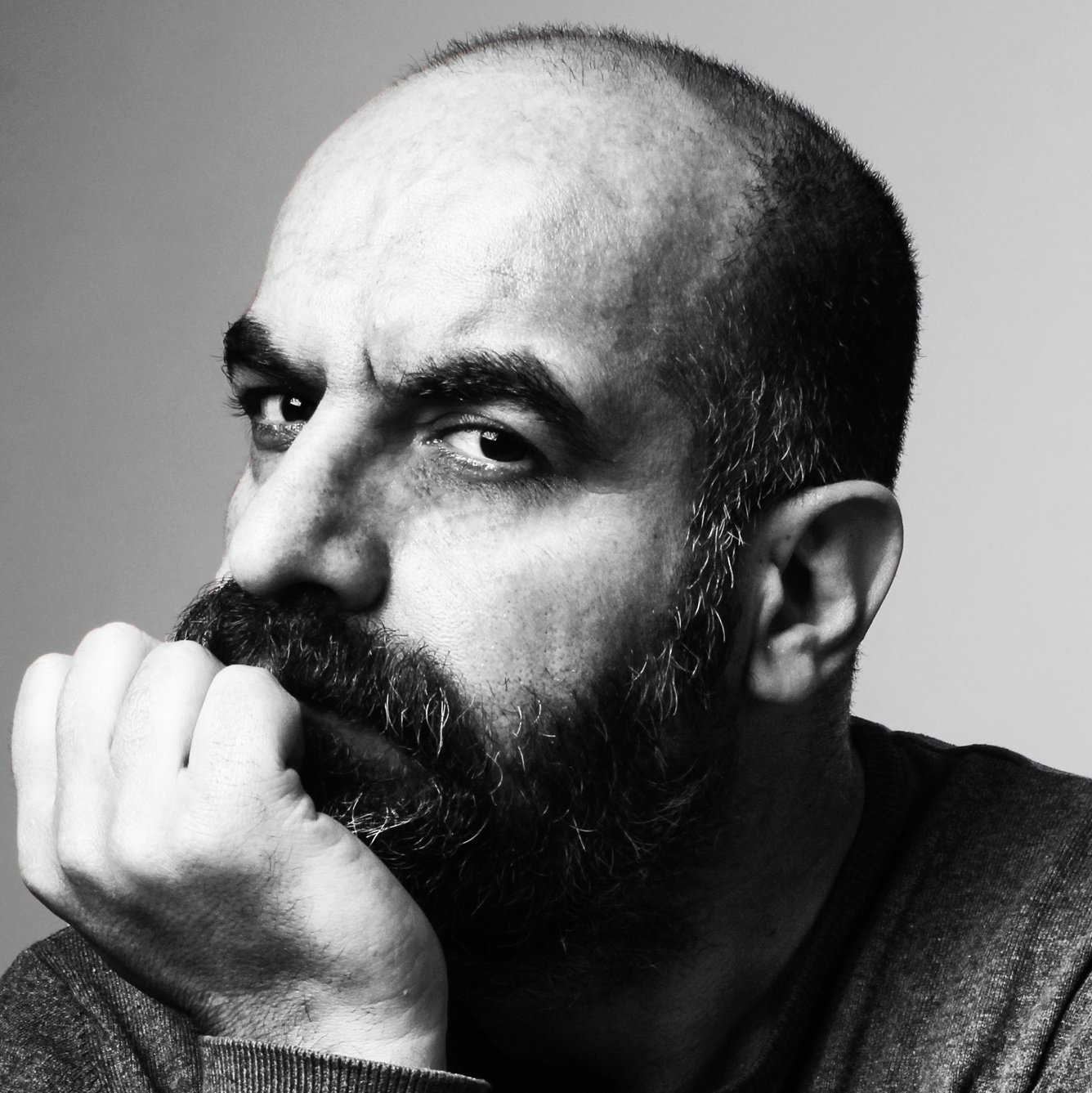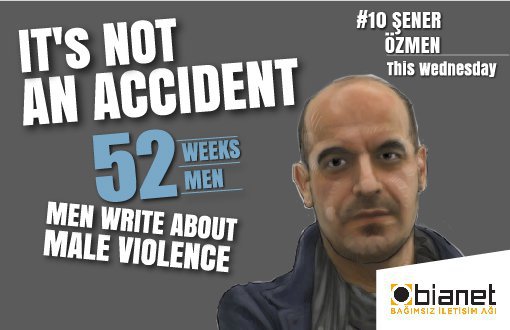Click to read the article in Turkish / Kurdish
There will not be a confession at the end of this piece, and there should not be one! I am saying that confessing what you have done long after you have retreated into a relatively safe space is not becoming of intellectual minds.
I have tried to live perhaps not an enviable but rightful life without making it unbearable for neither my loved ones nor the ones whom I have never seen but was told to hate. I have never harassed anyone, never used sentences like "intentionally or unintentionally".
There are women who I need to apologize to, foremost Zelal, the woman I love, whose life I entered through poetic and magical Kurdish.
For raising my voice that rears up with my father's genes...
For my brags like a typical Middle Eastern man...
For asking her "Where is my dinner?" during the first years of our relationship like as though she was not the one who worked 10 hours more than I did...
Obstinacy, power, roles and other weaknesses...
Weaknesses, yes, because only a deficiency, an incompleteness, a wound that has been carried from one place to the next makes someone say these. I am addressing all my Kurdish women audience through Ursula, who accompanies my dominant "male" character who lost his way in a rainforest in my book titled Xeyb, which has not been translated into Turkish yet. Ursula tells Kendal from Diyarbakır that she will get up from where she has crouched only on one condition: no matter how bad the situation is, he must be able to control his tone of voice and must never get angry with her. Besides, Ursula is neither a flower nor a butterfly, she belongs to no one, not to him or anyone else.
My early youth was difficult... especially when frazzled between the world of novels and the terrifying truth only a few steps from home.
My friends during this challenging journey were not my mother, father, family members or teachers, I will not blame them.
I loved my older brother to death who tried to save a kitten stuck between stacked rebars in the middle of the site of conflict, I was afraid of even the shadow of my mother, I missed my father's smell of sweat and face that was half Paul Newman half Steve McQueen, I was witnessing the fierce fights between my mother and father when he returned from Basibrîn (Mardin's village of Haberli) to Hezex (Idyl), with my brother and sister we were watching what was happening and crying for my father not to beat my mother and then curling up in a corner with eyes swollen from crying, and sleeping under the light of the gas lamp.
Then the lamp too would be puffed out, and we would feel like we are inside not a dark but a pitch-black liquid, like we are filled with that liquid inside and out, and even our heartbeats would stop, and we would bunch together so as to not go mad with fear. Mom cries, mom grumbles, mom gets beaten, mom cries, mom grumbles, dad beats her...
When September 12 [coup] stroke, one of the most frequent words I heard in Hezex was "Hikûmet" [government]: "Hikûmetê girtiye, hikûmetê kuştiye, hikûmetê avêtiye, hikûmetê..." [Government (in fact the army) captured, government murdered, government jailed, government...] I had no idea what, or especially who the government was but the things I heard in bits and pieces (mostly women were talking) suggested that it could be a woman.
It did not take me long to figure out that something was not right and that there were certain abnormalities around me be it among the neighbors or at the coffee shop, the mosque or the school. I went through times when the Muslim Kurdish children would torment the Assyrian children once school let out, I have forgotten many things but not this circle of violence. That is why I feel enraged, siding with the oppressed.
Without taking refuge in the language of neither poetry, which I wrote in Turkish for a long time and cut off with a single stroke that is the final book entitled Sözüm Haritadan Dışarı, nor the stories and novels that I began to write in Kurdish, this is as far as I could go in understanding whether what I have to confront is "manhood" or "man's view of woman", all the while feeling the pangs of not being able to voice these to the children and girls of a nation—which has been deemed deserving of all sorts of violence that I refrain from voicing or writing as it harbors a shame in its hues—because I remain on this side of the violence—though I wanted to remain on this side of the water!
In the catalogue of my solo exhibition titled Unfiltered curated by Süreyyya Evren at Arter, writer and editor H. G. Masters described the "Letter", which was exhibited as an artwork, saying, "The letter was illuminated on the gallery wall, like an ancient tablet carrying a timeless message, a gesture that elevated the autobiographical to the realm of the representative". Towards the end of this "Letter" I had talked about the obligation, introduced by our teachers in high school, to see the "remains of a separatist".
What I saw was nothing like the stories told about the body of my dead grandmother, they were on the ground, they were dressed differently, burned, battered, abused, torn, broken...
I could have understood, but I was not ready for the dead body of a woman, no! I was feeling a causeless anger against Yesenin, also against Mayakovsky who hit his head on the pavements of the Nevsky. That my mind did not, would not accept it, that this was the reason I staggered as a man...
How strange, is it not? After some time, we united (almost) as a whole family against the political opinions of my sister, which we found "extreme", and as if she was solely responsible for everything that had happened, as if it was she who brought the curse on Hezex, we wished to see her as a dismembered body under the makeshift pergola of the Municipality too, a wish that I realized far too late was nurtured by my mother herself.
My mother did not love my sister, not in the least... What about me and my big brother? I really do not like this word, big brother! How was it possible that we, who read Hugo von Hofmannsthal, wanted to punish her for polishing her nails? Alas, mother, I wish you had loved us a bit more instead of protecting us!
We should have loved her very, very, very much...
Unfortunately, I cannot say that the change-transformation started with the early political readings; they were dreary books and deadly subjects. Although the left had created an awareness in me, it had later tried to destroy it, and in its present state it looked terrible. The Maoist fathers I knew were boor men who inflicted violence on their women and daughters and used the Red Crag as a weapon. Magnificent manhood, overt or covert, was nurtured by fascism and fascism was programmed to destroy life.
To destroy...
At this juncture, for the fate of this piece I will borrow from a book that I read a long time ago and which rarely let me down when I recalled it, even though the days when I had the time and energy to jot down passages that I found impressive are long gone.
In his preface to Deleuze and Guattari's Anti-Oedipus, Foucault wrote, "How do we rid our speech and our acts, our hearts and our pleasures, of fascism? How do we ferret out the fascism that is ingrained in our behavior?" What I am talking about is how certain passages surface to your consciousness at certain moments and check up or take effect on you even if you do not remember them verbatim.
You surely have such quotes, too!
This too is just such a passage; but this quote from Foucault has a more encompassing side to it, more so than the preface to the booklet On Literature and Art by Marx and Engels, which I have not forgotten since high school (that I attended in İdil, then a district of Mardin) and which has remained in my memory as a beautiful prologue that read, "The mode of production of material life conditions the social, political and intellectual life process in general".
Yet another book was The Future Lasts Forever by Louis Althusser, which I read with a sinking heart, it tore to shreds my reflections about the future, which were already quite bleak. I felt that I could not really comprehend the structuralist Althusser, did he really kill his wife Hélène? The impact of the book was naturally not a fleeting one—they never know where to stop! It was a critical threshold; I knew that, as an existentialist young reader, I was not in a position to judge Althusser and this fluid thought was opening an intellectual space of terror filled with serious perspectives that were, oddly enough, defending him against the victim.
There was not a single drop of fascism inside me but this ephemeral world did not guarantee that fascism would never find its way there. Ever since the day we began killing women and freedom through a masculine language that is filled with innumerable mentions of women, love and freedom, I know that no poetry can be written—and that which is written will not be poetry—in my rugged geography, poetry is over!
Poetry was over after the white scream of Yazidi women, because there are no more women!
We killed all the women, our hands are all green.
We are waiting for a time when God will give them back to us as more obedient people. The fascism that is ingrained in our behavior...
These words keep coming back to me and hit home...
I was not at an age when I could ferret out the fascism at home—our acts point at childhood as the source of all fears—or the fascism that was ingrained in my Western teachers (most of whom are not alive today). Why were they beating us?! Was there no other way to make us better (!) people? Was it genetic to shrink in the face of oppression, did this malady pass down to us from our mothers and fathers?
In time, you forget all this, or you think you did until one day you witness the fascism inside you spill all over the place in a consistency that takes even you by surprise. Saying "It was a great movie!" after breathlessly watching the arbitrary violence directed against the fugitive—or let's say insane—Daisy Domergue in the Tarantino film The Hateful Eight (2015)... did that not portend what else we would come to affirm, approve?
I was actually tracing that which was ingrained in words, images. In fact, these words were sometimes composed into novels, sometimes into poems and sometimes into independent art works or even initiatives.
Let's drink to Daisy... For trampling on the magnificent manhood... (ŞÖ/ŞA/APA/SD/TK/IG)
* Images: Kemal Gökhan Gürses
CLICK TO READ ALL "52 MEN 52 WEEKS" ARTICLES
|





